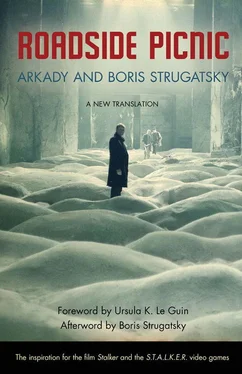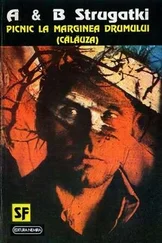Roadside Picnic was written without any delays or crises in just three stages. On January 19, 1971, we started the rough draft, and on November 3 of the same year we finished a good copy. In the interim we kept busy with a wide variety of (typically idiotic) pursuits—wrote complaints to the “Ruling Senate” (i.e., the secretariat of the Moscow Writers’ Organization), answered letters (which, sitting side by side, we did fairly rarely), composed a government application for a full-length popular-science film called The Meeting of Worlds (about contact with another intelligence), wrote three shorts for the popular Soviet television series Fitil (or something like it), thought of a plot for the TV movie They Chose Rybkin, worked out a first draft of the plot of the new novel Strange Doings at the Octopus Reef, and so on and so forth—there were no follow-ups or ultimate outcomes for any of these scribbles, and they have absolutely no relation to subsequent events.
Remarkably, the Picnic had a relatively easy passage through the Leningrad Avrora (a Soviet literary journal), not encountering substantial difficulties and sustaining damage only during the editing, and minor damage at that. Of course, the manuscript had to be purged of various “shits” and “bastards,” but these were all familiar trivialities, beloved by writers the world over; the authors didn’t retreat from a single principal position, and the magazine version appeared at the end of the summer of 1972, practically unscathed.
The saga of the Picnic at the publisher Young Guard (YG) was only beginning then. Actually, strictly speaking, it began in early 1971, when the Picnic didn’t yet exist on paper and the novel was only being offered in the broadest of terms in an application for an anthology. This putative anthology was called Unintended Meetings, was dedicated to the problem of humanity’s contact with another intelligence, and consisted of three novels, two finished— Dead Mountaineer’s Hotel and Space Mowgli —and one that was still being written.
Difficulties began immediately.
03/16/71—AS: …the higher-ups read the anthology, but are hemming and hawing and saying nothing definite. By their request, the anthology was given to a certain doctor of historical sciences (?) to review—on the grounds that he really likes science fiction…. Then the manuscript, along with this review, will come back to Avramenko [the assistant head editor] (probably to give her a chance to reevaluate the existing, but secret, assessment?), and after that will make its way to Osipov [the head editor], and only then will we be apprised of our fate. Bastards. Critics.
04/16/71—AS: I saw Bella at the YG. She said there’s nothing doing. Avramenko asked her to try to be diplomatic about it: to tell us that there’s no paper, and they are all booked up, and so on, so forth, but she told me straight out that somewhere in the upper echelons they suggested having nothing to do with the Strugatskys for the time being…. That’s the hegemony bearing down!
And the Picnic wasn’t written yet, and we’re talking, essentially, about novels that have never caused a Big Ideological Disturbance, about little stories that are completely harmless and even apolitical. It’s just that the higher-ups wanted nothing to do with those Strugatskys at all, and this overall reluctance was being superimposed on a difficult situation within the publishing house: this was right at the time that the change of leadership was taking place, when they were beginning to root out all the best things created by the then-editorial SF staff under Sergei Georgievich Zhemaitis and Bella Grigorievna Kliueva, due to whose cares and labors flourished the second generation of Soviet science fiction.
At the start of the 1980s, Arkady and I were giving serious thought to the project of gathering, organizing, and disseminating, at least by samizdat, “A History of One Publication” (or “How It’s Done”)—a compendium of genuine documents (letters, reviews, complaints, applications, authorial wails and howls in written form) related to the history of publishing the anthology Unintended Meetings, whose key novel turned out to be the Picnic. At one time, I had even begun systematically sorting and selecting the existing materials, but soon gave it up; it was dead-end work, a laborious task with no future, and there was a certain palpable immodesty in the whole project—who were we, after all, to use our own example to illustrate the functioning of the ideological machine of the 1970s, especially against the background of the fates of Aleksandr Solzhenitsyn, Georgi Vladimov, Vladimir Voinovich, and many, many other worthies?
The project was abandoned, but we returned to it once more after the beginning of perestroika in the mid-1980s, during the dawn of the new and even newest times, when there appeared a real possibility of not merely passing around a certain collection of materials but of publishing it according to all the rules, with didactic commentary and venomous descriptions of the main characters, many of whom had retained their positions at the time and were capable of influencing literary processes. We were joined by indefatigable ludens [a Strugatsky term indicating a subspecies of humans with superior mental powers —tr.]: Vadim Kazakov, a science fiction expert and literary critic from Saratov, and his friends. I relayed all the materials to them—the compendium was for the most part ready—but pretty soon it became clear that there was no real possibility of publishing it; no one had the money for this kind of publication, which was unlikely to be profitable. Besides, things were happening at breakneck speed: the putsch, Arkady’s passing, the fall of the USSR, the democratic revolution—a velvet revolution, but a revolution nonetheless. For a period of literally months, our project lost the most minimal relevance.
And now I’m sitting behind a desk, staring at three reasonably thick folders lying in front of me, and am aware of a disappointment mixed with uncertainty and a noticeable touch of bewilderment. Inside these folders are the letters to the Young Guard publishing house (to the editors, the managing editor, the head editor, the director), complaints to the Central Committee of the All-Union Leninist Young Communist League (CC AULYCL), plaintive petitions to the Department of Culture of the Central Committee of the Communist Party of the Soviet Union (CC CPSU), and, of course, replies from all these organizations and our letters to each other—a veritable mountain of paper, by the most conservative calculation more than two hundred documents—and I have no idea now what to do with it all.
At first, I was looking forward to using this afterword to tell the story of publishing the Picnic: naming once-hated names; jeering to my heart’s content at the cowards, idiots, informers, and scoundrels; astounding the reader with the absurdity, idiocy, and meanness of the world we’re all from; being ironic and instructive, deliberately objective and ruthless, benevolent and caustic all at once. And now I’m sitting here, looking at these folders, and realizing that I’m hopelessly late and that no one needs me—not my irony, not my generosity, and not my burntout hatred. They have ceased to exist, those once-powerful organizations with almost unlimited right to allow and to hinder; they have ceased to exist and are forgotten to such an extent that it would be tedious and dull to explain to the present-day reader who is who, why it didn’t make sense to complain to the Department of Culture of the CC, why the only thing to do was to complain to the Department of Print and Propaganda, and who were Albert Andreevich Beliaev, Pyotr Nilovich Demichev, and Mikhail Vasilyevich Zimyanin—and these were the tigers and elephants of the Soviet ideological fauna, rulers of destinies, deciders of fates! Who remembers them today, and who cares about those of them who are still among the living? So then why bother with the small fry—the shrill crowd of petty bureaucrats of ideology, the countless ideological demons, who caused untold and immeasurable harm and whose vileness and meanness require (as they liked to write in the nineteenth century) a mightier, sharper, and more experienced pen than my own? I don’t even want to mention them here—let them be swallowed up by the past, like evil spirits, and disappear…
Читать дальше












